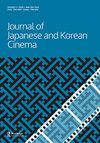韩国酷儿电影、民族他者与《无国籍事物》中的酷儿空间制作(2011)
引用次数: 0
摘要
本文通过细读《无国籍的事物》(Jultak dongsi, Kim Kyung-mook, 2011)来探讨韩国酷儿电影的空间政治和美学。本文的重点有两个方面。首先,探讨了影片在批判韩国民族进步逻辑及其民族中心主义时,是如何运用叙事和形式主义元素进行实验的。其次,它描绘了电影中奇怪的空间运用。通过对这部电影的仔细审视,本文认为韩国酷儿电影的优点在于它热切地努力在银幕上恢复社会边缘化人群的历史,并揭示了酷儿生活中不能被纳入异性恋规范逻辑的方面。本文章由计算机程序翻译,如有差异,请以英文原文为准。
Queer Korean cinema, national others, and making of queer space in Stateless Things (2011)
ABSTRACT This article examines the spatial politics and aesthetics of queer Korean cinema through a close reading of Stateless Things (Jultak dongsi, Kim Kyung-mook, 2011). The focus of this article is twofold. Firstly, it explores the way in which the film experiments with both narrative and formalistic elements in critiquing South Korean national logic of progress and their ethnocentrism. Secondly, it delineates the queer use of space in the film. Through a careful examination of the film, this article argues that the virtue of queer Korean cinema lies in its ardent effort to reinstate the history of socially marginalized people on screen and to disclose the aspects of queer lives that cannot be subsumed under the heteronormative logic of progress.
求助全文
通过发布文献求助,成功后即可免费获取论文全文。
去求助
来源期刊

Journal of Japanese and Korean Cinema
Arts and Humanities-Visual Arts and Performing Arts
CiteScore
0.60
自引率
0.00%
发文量
16
期刊介绍:
Journal of Japanese and Korean Cinema is a fully refereed forum for the dissemination of scholarly work devoted to the cinemas of Japan and Korea and the interactions and relations between them. The increasingly transnational status of Japanese and Korean cinema underlines the need to deepen our understanding of this ever more globalized film-making region. Journal of Japanese and Korean Cinema is a peer-reviewed journal. The peer review process is double blind. Detailed Instructions for Authors can be found here.
 求助内容:
求助内容: 应助结果提醒方式:
应助结果提醒方式:


